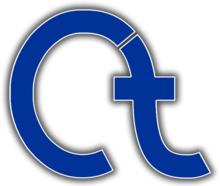CrypTool
 E-Learning Program for Cryptography | |
| Developer(s) | Bernhard Esslinger |
|---|---|
| Initial release | 1998; 26 years ago (1998) |
| Stable release | CT 1.4.42 (December 2021) CT 2.1 (release 2022.1) (December 2022) |
| Repository |
|
| Operating system | CT1 and CT2: Microsoft Windows, JCT: Win, Linux and macOS |
| Type | Cryptography, Encryption, Privacy, E-Learning |
| License | Apache Licence 2.0 |
| Website | www |
CrypTool is an open-source project[1] that is a free e-learning software for illustrating cryptographic and cryptanalytic concepts.
History
The development of CrypTool started in 1998. Originally developed by German companies and universities, it is an open-source project since 2001.[2]
Currently 4 versions of CrypTool are maintained and developed: The CrypTool 1 (CT1) software is available in 6 languages (English, German, Polish, Spanish, Serbian, and French). CrypTool 2 (CT2) is available in 3 languages (English, German, Russian). All others, JCrypTool (JCT) and CrypTool-Online (CTO), are available only in English and German.[3]
The goal of the CrypTool project is to make users aware of how cryptography can help against network security threats and to explain the underlying concepts of cryptology.[4]
CrypTool 1 (CT1) is written in C++ and designed for the Microsoft Windows operating system. A port of CT1 to Linux with Qt4 was started, but there is no progress anymore.[5]
In 2007, development began on two additional projects, both based on a pure-plugin architecture, to serve as successors to the original CrypTool program. Both successors regularly publish new stable versions:
- CrypTool 2[6][7] (built with C#/.NET/WPF) (abbreviated CT2)
- uses the concept of visual programming to clarify cryptographic processes. Currently, CT2 contains more than 150 crypto functions.

- JCrypTool 1.0[8][9] (built with Java/Eclipse/RCP/SWT) (abbreviated JCT)
- runs on Windows, macOS, and Linux, and offers both a document-centric and a function-centric perspective. Currently, JCT contains more than 100 crypto functions. One of its focal points are modern digital signatures (like Merkle trees and SPHINCS).
The CrypTool project is now being developed at the research institute CODE at the Bundeswehr University Munich.[10]
CrypTool is used in schools, universities,[11] companies and agencies for education and awareness training.[12][13][14][15]
Merger with CrypTools
In early 2020, the CrypTool project decided to merge[16] with a similar project of the same name, CrypTools, founded in 2017 in Australia by Luka Lafaye de Micheaux, Arthur Guiot, and Lucas Gruwez.[17] CrypTool, much older and known, thus completely "absorbs" the project under its name.

The first impact of this merger is the rebranding of the project. A new logo, a new website, and the new CTO version are announced. Currently, it's still in development. Another change was the targeted audience. Previously, CrypTool focused on (university) students, and CrypTools on developers and young people. It was therefore necessary to broaden the audience.[citation needed]
See also
- Asymmetric key algorithm
- Topics in cryptography
- Cryptosystem
References
- ^ Esslinger, Bernhard (22 September 2016). "CrypTool: An Open-Source E-Learning Project for Cryptography and Cryptanalysis" (PDF). Gesellschaft fuer Informatik, Crypto Day at SAP. This presentation delivers an overview. University of Siegen. Archived from the original (PDF) on 8 January 2017. Retrieved 26 September 2018.
- ^ Esslinger, Bernhard (23 April 2013). "CrypTool: Modern open-source e-learning programs for cryptography and cryptanalysis" (PDF). Forum for Research and Innovation in Security and Communications. Retrieved 26 September 2018.
- ^ "CrypTool 1: Downloads". CrypTool 1. Retrieved 26 September 2018.
- ^ "CrypTool for Awareness". CrypTool Portal. Retrieved 26 September 2018.
- ^ CrypTooLinux project Archived 17 October 2016 at the Wayback Machine Porting CT1 to Linux.
- ^ CrypTool 2: Developer site of the CT2 project Besides release and beta versions, each day a so called "Nightly Build" is produced for download.
- ^ CrypTool 2: Facebook Site of the CT2 project
- ^ JCrypTool 1.0: GitHub project of JCT Beta versions are updated each weekend as so called "Weekly Builds" for download.
- ^ JCrypTool 1.0: Site of the JCT project
- ^ "Kryptografie-Lernsoftware CrypTool wird jetzt an der Bundeswehr-Uni in München weiterentwickelt". Secupedia. Retrieved 29 August 2024.
- ^ Adamovic, Sasa; Sarac, Marko; Veinovic, Mladen; Milosavljevic, Milan; Jevremovic, Aleksandar (2014). "An Interactive and Collaborative Approach to Teaching Cryptology". Educational Technology & Society. 17 (1): 197–205. JSTOR jeductechsoci.17.1.197.
- ^ "Winter School in Information Security. Overview presentation, Finse 1222, April 21-26, 2013". Forum for Research and Innovation in Security and Communications. 6 February 2013. Retrieved 26 September 2018.
- ^ Eckert, Claudia; Clausius, Thorsten; Esslinger, Bernd; Schneider, Jorg; Koy, Henrik. "CrypTool, 2003-08-07" (PDF). Technische Universitaet Darmstadt. Technische Universitaet Darmstadt. Retrieved 26 September 2018.[permanent dead link]
- ^ Kopal, Nils. "Solving Classical Ciphers with CrypTool 2" (PDF). Linköping University Electronic Press. Linköping University Electronic Press. Retrieved 26 September 2018.
- ^ Ronald, Kenneth. "Crypto Casino". Retrieved 14 January 2024.
- ^ "Arthur Guiot - Merging CrypTool & CrypTools". arguiot.com. Archived from the original on 6 June 2020. Retrieved 17 May 2020.
- ^ CrypTools project (2017), An introduction to CrypTools.
External links
- Official website
- CrypTool-Online
- International Cipher Contest "MysteryTwister" (MTC3)
- – presentation-en.pdf Presentation about the CrypTool-1 program with more than 100 slides and many screenshots















